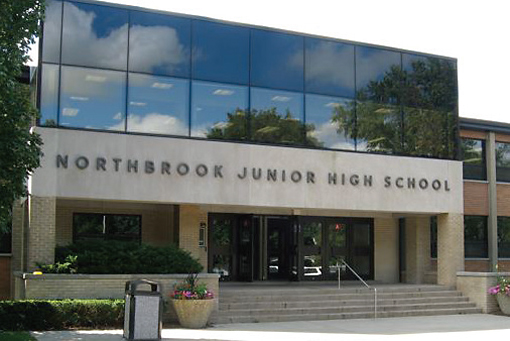| 제목 | [DAIKIN] K-12 EDUCATION - Northbrook Jr High | 작성일 | 16-06-16 13:13 |
| 글쓴이 | 최고관리자 | 조회수 | 4,742 |
본문
Northbrook Junior High School in Northbrook, Illinois, reduced its energy cost per square foot by an estimated 18% and won an Energy Star rating as a result of HVAC system renovations.
CASE STUDY
K-12 Education
Name
Northbrook Junior High School
Location
Northbrook, IL USA
Facility Size
2 stories, 135,000 ft2 facility
Issue
Nine additions resulting in severe overheating
Solution
Two 170 Daikin Magnitude® magnetic bearing chillers
Illinois school HVAC retrofit earns an Energy Star® for 18% annual energy savings with Daikin chillers
A quiet learning environment, consistent comfort and energy efficiency topped the list of requirements at Northbrook Junior High School in selecting chillers as part of a $1.88 million life-safety improvement renovation project. The two-story, 135,000-square foot school was originally built in 1958 and now serves 650 students in grades six through eight in Northbrook, Illinois, north of Chicago. The renovation project included replacement of all heating and cooling system components. "We had a building with nine additions over the years and a severe overheating issue," says Russ Jensen, director of buildings and grounds for Northbrook School District 28.
Quiet comfort a priority
With the priorities of quiet comfort and energy efficiency in mind, the project renovation team selected the Daikin WMC magnetic bearing compressor chiller with its industry leading efficiency and ultra-quiet operation.
"The biggest selling factor for me in selecting the two 170-ton Daikin WMC chillers was the noise factor. The chiller plant is located next to three classrooms in the lower level so the equipment had to be quiet," says Jensen.
His views are echoed by John Kluber, partner with architectural engineering firm Kluber, Skahan and Associates in Batavia, Illinois. "You can't have noise and vibration in schools with classrooms so close to the chiller plant." Daikin WMC chillers have the quietest sound levels in the industry with sound pressure ratings as low as 77 dBA per AHRI Standard 575.
The right technology for the job Kluber first saw the Daikin WMC chiller technology several years ago and knew it was right for the Northbrook project because Daikin WMC chillers effectively handle variable flow.
This capability was important because the school was converting from a primary-secondary pumping scheme to a more efficient variable primary pumping system during the renovation.
"Variable primary systems can be problematic because of the limitations of typical chillers to handle the variable flow. But Daikin WMC chillers can go down to low flow as necessary."
Jensen adds, "The technology of Daikin WMC chillers and the high level of Daikin service reinforced our decision to change the system design. We were able to proceed with a primary pumping system in a two-pipe configuration." He says the former system required more pumps with each new building addition that was constructed over the years. A total of 26 pumps were removed in the renovation since the new system requires only one main pump and a backup pump.
As part of the retrofit the old natural gas direct-fired absorber was removed and replaced with the two electric Daikin chillers. The building's original boiler was replaced with two high efficiency condensing boilers. "The old system used a piping loop for the cooling system tied into the heating system at the plant. We had two sources of heat in every classroom with one source of control," Jensen says.
Energy Savings Summary

Energy savings after chiller replacement
18% annually
Energy Star
gold star award
Utility rebate
5% of the total installation cost, based on energy saved
Complex control systems
The school renovation project also included the design and installation of a comprehensive building automation system which controls everything from the indoor air environment to outside parking lot lights.
"One of the most challenging parts of the project involved integrating the building's various control systems to communicate with each other," says Chad Elliott, project manager with Premier Mechanical, Inc. in Addison, Illinois. The Daikin chillers, along with the cooling tower and pumps, are part of the chiller plant controller designed to optimize efficiency at different loading scenarios. The chiller plant controller in turn communicates with the building automation system from TAC.
Jensen explains, "The chiller plant controller communicates with the chillers, boilers and pumps using Modbus® protocol. The building automation system communicates with the chiller plant controller and other building systems using either LonTalk® or BACnet® protocol."
Elliott and the entire project team credit the fine work of temperature control contractor Precision Controls of Chicago for making the control systems integration work.
In addition to the system integration, Jensen and the school custodial team also appreciate the user-friendly touch screen operator panel on each Daikin chiller that makes it easy for them to monitor chiller operating conditions at a glance.
Magnitude chillers and retrofits: winning combination
According to the Daikin representative for the project from Thermosystems, Inc., of Lombard, Illinois, the Magnitude chillers are a perfect solution for this type of retrofit project. "Not only did the Northbrook school district replace a chiller plant with an energy efficient and quiet product, but also solved a refrigerant problem," explains the Daikin representative. The Daikin Magnitude chiller uses R-134a, a refrigerant with no phase-out schedule and no ozone depletion potential.
Tight fits and tight schedules
The compact design of the Daikin Magnitude chillers was a key factor in the timely completion of the renovation. The project had a tight timeline for removal of old equipment, installation and commissioning of new equipment. "The tear-down started in late May 2007 and we worked through the summer to complete the project by the August 24, 2007, due date which was driven by the start of the school year," Elliott says.
The project required excavation through the side of the building into a 12 by 5-feet well area, alongside the building's lower level. Elliott explains the space was opened up as a permanent part of the approximate 900-square foot plant room. "The space which houses the pumps was opened to allow for the pass-through of equipment by crane. We removed a metal grating and cut a hole in the side of the building and put a new roof over the area. The equipment pass-through was tight but allowed all equipment to be delivered fully assembled."
A gold star from Energy Star
All told, the system renovations brought Northbrook Junior High an estimated 18 percent reduction in annual energy cost per square foot in both electrical and gas usage. Kluber says the specific energy performance of the entire systems including cooling tower, pumps, and chillers was 0.38 kW/ton. He adds that the school's electricity consumption actually decreased even though new electric chillers were added to the system.
In December 2008, Northbrook Junior High qualified for the U.S. EPA's Energy Star rating for K-12 schools based on the 12-month period ending October 31, 2008. To qualify for an Energy Star rating requires a rating of 75 or better for a source energy intensity of 147 kbtuh/ft2/yr. Northbrook's source energy intensity was determined to be 109 kbtuh/ ft2/yr. The school consumes 26 percent less energy when compared to others in size and location for a rating of 79, according to Kluber.
"We strive to be as efficient as possible without affecting the end user." Jensen says. He notes that the Daikin chillers brought the school the optimized efficiency it wanted without any compromise to reliability. "It's amazing to see a building that is fifty-plus years old with so many additions all maintaining a comfortable environment at any given time of day, regardless of the season."
Northbrook Junior High is already planning another addition, which the Daikin chillers are ready to handle. Jensen says the four-school district will certainly consider Daikin Magnitude chillers in future retrofit projects. "It's our priority to maintain comfort levels in the classrooms to maintain an optimal environment for students to learn," Jensen concludes.

The chiller plant is located next to three classrooms in the lower level so the equipment had to be quiet. The Daikin WMC Chiller is the quietest chiller in its size range with sound pressure levels as low as 77 dBA per AHRI Standard 575.
| 이전글 | [DAIKIN] K-12 EDUCATION - Harford Board of Education 2016-06-16 | ||
| 다음글 | [DAIKIN] K-12 EDUCATION - Philadelphia School Administration 2016-06-16 | ||






